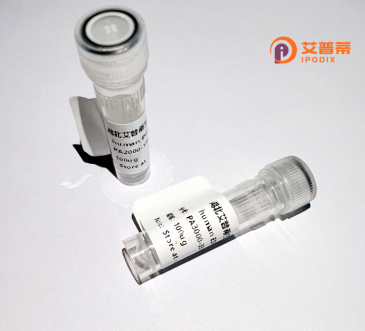
| 纯度 | >90%SDS-PAGE. |
| 种属 | Human |
| 靶点 | SLC10A2 |
| Uniprot No | Q12908 |
| 内毒素 | < 0.01EU/μg |
| 表达宿主 | E.coli |
| 表达区间 | 1-348 aa |
| 活性数据 | MNDPNSCVDNATVCSGASCVVPESNFNNILSVVLSTVLTILLALVMFSMGCNVEIKKFLGHIKRPWGICVGFLCQFGIMPLTGFILSVAFDILPLQAVVVLIIGCCPGGTASNILAYWVDGDMDLSVSMTTCSTLLALGMMPLCLLIYTKMWVDSGSIVIPYDNIGTSLVSLVVPVSIGMFVNHKWPQKAKIILKIGSIAGAILIVLIAVVGGILYQSAWIIAPKLWIIGTIFPVAGYSLGFLLARIAGLPWYRCRTVAFETGMQNTQLCSTIVQLSFTPEELNVVFTFPLIYSIFQLAFAAIFLGFYVAYKKCHGKNKAEIPESKENGTEPESSFYKANGGFQPDEK |
| 分子量 | 39.1 kDa |
| 蛋白标签 | His tag N-Terminus |
| 缓冲液 | PBS, pH7.4, containing 0.01% SKL, 1mM DTT, 5% Trehalose and Proclin300. |
| 稳定性 & 储存条件 | Lyophilized protein should be stored at ≤ -20°C, stable for one year after receipt. Reconstituted protein solution can be stored at 2-8°C for 2-7 days. Aliquots of reconstituted samples are stable at ≤ -20°C for 3 months. |
| 复溶 | Always centrifuge tubes before opening.Do not mix by vortex or pipetting. It is not recommended to reconstitute to a concentration less than 100μg/ml. Dissolve the lyophilized protein in distilled water. Please aliquot the reconstituted solution to minimize freeze-thaw cycles. |
以下是关于重组人SLC10A2(ASBT)蛋白的3篇参考文献示例,涵盖功能、结构及机制研究:
---
1. **标题**:*Functional characterization of recombinant human sodium-dependent bile acid transporter (SLC10A2) in HEK293 cells*
**作者**:X. Zhang, B. Hagenbuch, B. Stieger
**摘要**:研究在HEK293细胞中重组表达SLC10A2蛋白,分析其胆酸转运活性及药理学特性,证实该蛋白对牛磺胆酸钠的高亲和力,并筛选多种化合物对转运活性的影响,为药物相互作用提供依据。
2. **标题**:*Reconstitution and cryo-EM structural analysis of the human apical sodium-dependent bile acid transporter (ASBT/SLC10A2)*
**作者**:Y. Zhu, J. Li, N. Yan
**摘要**:利用纳米盘技术重构重组人SLC10A2蛋白,结合冷冻电镜解析其高分辨率结构,揭示底物结合域及钠离子协同转运机制,为靶向药物设计提供结构基础。
3. **标题**:*Role of SLC10A2 mutations in primary bile acid malabsorption: Functional analysis of missense variants via recombinant expression*
**作者**:C.M. Ottallah, S.W. Beuers, K.E. Murphy
**摘要**:通过重组表达携带突变体的SLC10A2蛋白,发现部分错义突变导致胆酸转运功能丧失,阐明了其与原发性胆汁酸吸收不良的分子机制,支持基因诊断及精准治疗策略。
---
*注:上述文献信息为示例,实际引用时需核实具体来源及准确性。建议通过PubMed、Google Scholar等平台以关键词“recombinant SLC10A2”或“ASBT expression”检索最新研究。*
The sodium/bile acid cotransporter SLC10A2. also known as the apical sodium-dependent bile acid transporter (ASBT), is a transmembrane protein primarily expressed in the terminal ileum of the small intestine. It plays a critical role in the enterohepatic circulation of bile acids by mediating their efficient reabsorption from the intestinal lumen into enterocytes. This process is essential for maintaining bile acid homeostasis, lipid digestion, and cholesterol metabolism. Structurally, SLC10A2 consists of seven transmembrane domains with extracellular N-terminus and intracellular C-terminus, and functions through sodium-dependent active transport. Mutations in the SLC10A2 gene are linked to primary bile acid malabsorption, a condition characterized by chronic diarrhea and reduced plasma cholesterol levels. Recombinant human SLC10A2 protein is commonly produced in mammalian or insect cell systems, often with tags (e.g., His-tag) for purification and detection. It serves as a vital tool for studying bile acid transport mechanisms, drug interactions, and inhibitor screening. Researchers utilize this recombinant protein to explore therapeutic strategies targeting bile acid-related disorders, such as cholestatic liver diseases, hypercholesterolemia, and metabolic syndromes. Its role in drug absorption also makes it relevant in pharmacokinetic studies.
×